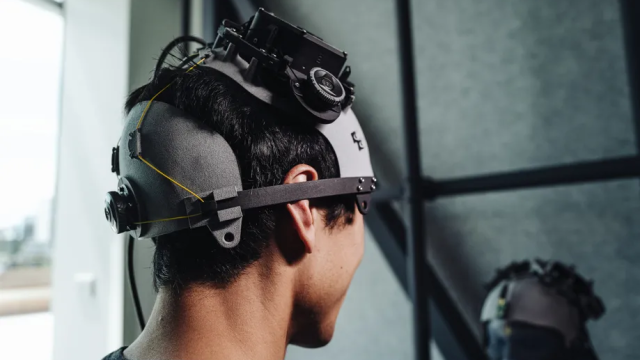Facebook is mostly abandoning its plan to hook users’ brains directly into Facebook, at least for now. For the foreseeable future, you’ll have to settle for hooking your wrist directly into an Oculus Rift.
The social network announced in a blog post that it is abandoning an effort to develop headbands or headsets that allow users to type quickly and control computers by thinking (and presumably, act as brain-Facebook interfaces in the future). Instead of continuing work on their own prototype helmet, its experimental Facebook Reality Labs hardware division will focus its work in the area on developing a wristband that reads muscle signals to control augmented and virtual reality systems like its Oculus line of VR headsets. According to MIT Technology Review, Facebook staff who worked on the project said its original scope was perhaps too ambitious.
“We got lots of hands-on experience with these technologies,” Mark Chevillet, a physicist and neuroscientist who worked on the project but now studies Facebook’s impact on democracies, told Technology Review. “That is why we can confidently say, as a consumer interface, a head-mounted optical silent speech device is still a very long way out. Possibly longer than we would have foreseen.”
Chevillet reassured Technology Review that although the four-year development effort included Facebook-funded brain surgeries and prototypes that beamed light through skulls, and unlike SpaceX/Tesla CEO Elon Musk’s Neuralink project, “We never had an intention to make a brain surgery product.”
Some of Facebook’s resources went to fund research by Edward Chang at the University of California, San Francisco that involved surgically implanting electrode pads on people’s brains (electrocorticography). The technique allows for the reading of large numbers of neurons at once, and according to Technology Review, the research team reported to the New England Journal of Medicine on Wednesday they had developed a method that allowed a man rendered unable to speak following a stroke to type sentences at the rate of about 15 words a minute. However, the researchers were only able to train the subject, Bravo-1, to type around 50 words, and the system was only 40% accurate (75% after a language model that corrected mistakes in translation was added).
That’s an impressive step forward in medical science, but it’s clearly nowhere close to the kind of device that Facebook would want to try and pitch to users. So Facebook is winding down its own development into its prototype Facebook Reality Labs helmet, making its software open-source, and allowing external researchers to take a look at its experimental hardware. Chevillet told Technology Review, “We see applications in the foreseeable future in clinical assistive technology, but that is not where our business is. We are focused on consumer applications, and there is a very long way to go for that.”
Technology Review wrote that the VR wristband project will involve technology from CTRL-Labs, a company it acquired for between $US500 ($669) million and $US1 ($1.4) billion in 2019.
“It makes sense to focus our near-term attention on wrist-based neural interfaces using EMG, a proven viable technology we believe has a nearer-term path to market for AR/VR input,” Facebook wrote in the blog post.
“Speech was the focus of our BCI research because it’s inherently high bandwidth — you can talk faster than you can type. But speech isn’t the only way to apply this research — we can leverage the BCI team’s foundational work to enable intuitive wrist-based controls, too,” the company added. “Given this, we’re no longer pursuing a research path to develop a silent, non-invasive speech interface that would allow people to type just by imagining the words they want to say. Instead of a speech-based neural interface, we’re pursuing new forms of intuitive control with EMG.”
Facebook, eternally mired in controversy, is going through another bad PR cycle due to the release of Sheera Frenkel’s and Cecilia Kang’s book, An Ugly Truth, which documents the company’s long history of allowing disasters like its role in the genocide in Myanmar or its infestation of far-right clickbait to fester in the name of profit.
This isn’t the only Facebook hardware project to run into trouble lately. This week, the Information reported that over a dozen members of its satellite-internet team had left to work on a rival project at Amazon, apparently as part of an official talent acquisition deal between the two companies.
